Who's afraid of the big bad VAT man?
Page 40

If you've noticed an error in this article please click here to report it so we can fix it.
Getting a handle on the facts about VAT
makes it much less intimidating. Steve
James explains how to keep on top of it.
Value Added Tax is a tax on the supply of goods or services. The responsibility for its administration and collection lies with HM Customs & Excise.
VAT is chargeable on supplies of goods or services made by a business and is ultimately payable by the consumer. Where supplies are made to another business, that business can offset the tax it is charged against the tax it must charge to its customer in the supply chain. If a business pays more VAT to its suppliers than it charges to its customers it can recover the difference from Customs.
Supplies made by businesses may be subject to VAT at a positive rate, the zero rate or may be exempt or outside the scope of the tax. Although no VAT is charged on zero-rated. exempt or outside the scope supplies the distinction between them is crucial. Exempt supplies, in nearly all cases, do not allow input tax incurred by the business lobe claimed, whereas zero-rated and (most) outside the scope supplies do.
VAT registration The first obligation faced by most businesses is the need to register for VAT. In the UK the registration threshold, since April 2004, is a turnover of £58,000 pa. Once registered a business must collect VAT from its customers and pass this on to Customs & Excise.
There are two tests a business must consider to determine when it has to register for VAT.
The first is the historic test, which says a business must register for VAT when its taxable turnover has exceeded the VAT registration threshold in the previous 12 months. This is a rolling 12-month period and the test must be applied at the end of each month. If the limit is exceeded the business must notify Customs.
The second test is forward-looking and says a business is liable to be registered if, at any time, there are reasonable grounds for believing its taxable turnover in the next 30 days will exceed the registration threshold.
Where a business is taken over the buyer must take account of the seller's turnover in establishing if or when VAT registration is required.
If a business can show that its taxable turnover in the ensuing 12 months will fall below the deregistration limit,currently£56,000,it can apply to cancel its registration, or ask Customs to waive registration if it has exceeded the registration threshold but is not yet registered.
Businesses can apply for voluntary VAT registration if their taxable turnover is below the registration threshold or if they make supplies outside the UK which would be taxable if made in the UK.
Returns and payment of tax A business which is registered for VAT is obliged to pay the output tax it has collected on its supplies to Customs after deducting any input tax it is allowed to offset. This is done by submitting a VAT return showing the appropriate information and making the required payment.
Returns are normally made on a quarterly basis, although monthly returns are available for businesses which usually receive refunds from Customs or can be imposed by Customs if they consider tax is at risk. For small businesses with a turnover of up to £660,000 annual VAT returns can he submitted, but monthly or quarterly interim payments are required with a balancing payment at the year end. Records and inspections A business which has registered for VAT must keep records to identify the tax that is due and the supplies it has made. Businesses must keep a VAT account ,copies of all invoices,credit and debit notes received or issued, and documentation relating to imports or exports, both for EU and non-EU transactions.
Records must be kept for six years, although certain documents may be destroyed earlier if agreement is reached with Customs.
Customs have the right to inspect business records and premises at a reasonable time. Businesses must allow Customs to remove records,take samples or make copies of records if required. Customs cannot search premises unless they have obtained a search warrant.
Adjustments and assessments If a business discovers that it has made an error, which has resulted in an underpayment of VAT, it is obliged to notify this to Customs and make the necessary payment. If the amount is less than £2,000 the adjustment can be made on the next VAT return, if it exceeds this amount a separate Voluntary Disclosure to Customs is required.
If a business has received an assessment from Customs and has reason to believe that the assessment is too low it must notify Customs of the correct amount of tax which is due.
Tax avoidance schemes disclosure For VAT return periods beginning after 1 August 2004 a business which has a turnover in excess of £600,000 must notify Customs if it is using a listed tax avoidance scheme.
• Steve James is an associate director with WJB Chiltern.






























































































































































































